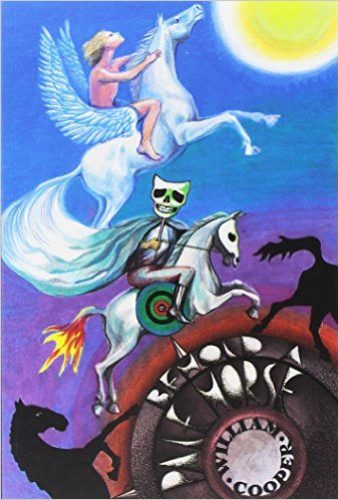Caveat Emptor: I get into a somewhat aggressive discussion about biblical literalism below.
Before I dig into this review, I have a confession to make: I didn’t finish Behold a Pale Horse. I couldn’t. I think that if the election had gone differently, if the world didn’t seem so crazy right now, that I might have been able to finish it.
But I just couldn’t get through it. William Cooper’s frantic writing, logically fallacious conclusions, and absolute certainty about the end-times in which the Illuminati rise to power (the dates of which are well behind us) made it impossible to read. It may be that I’m throwing the baby out with the bathwater here, given the likelihood that there are kernels of truth contained in the sprawling madness of Cooper’s words, but I’m not too bothered by that prospect.
Cooper alleges that all secret societies are connected, that all serve the Illuminati, and that all are working toward a singular goal: the subjugation of humanity. Meh. He also thinks that the Protocols of the Elders of Zion is actually an Illuminati document, and pretty much any time the Protocols are invoked, my eyes roll so far into the back of my head that I can see my own neurons shutting down.
What I found most interesting about my partial (around 50%) read of the book was an observation I made regarding Constitutional Purists. Cooper’s rabid loyalty to the Constitution (with which he lumps in the Bill of Rights, a concept I’ll expand on below) reminds me of Biblical Literalists. People whose deeply held beliefs require certain cognitive sacrifices—to actively ignore millennia of human progress; to make use of the consumer benefits of the scientific method while denying the process that leads to those tangible discoveries; to selectively choose that some biblical Truths are more True than others, while still others can be completely ignored.
When Cooper talks about the Constitution, he talks of an infallible work of genius, a document of such tremendous power and unfailing wisdom that it alone could rule the land. And he lumps in the Bill of Rights—the first 10 amendments to that infallible Constitution—along with them.
Think about that for a minute. The Bill of Rights, comprised of those tremendously important changes to the infallible document, specifically having to do with personal freedoms. The thing was designed to change with the changing world.
Change is terrifying, no doubt about that. Our understanding of the world around us is constantly bombarded by new information, and that bombardment has only grown more fierce with the development of the astounding communication technologies on which we rely every day.
Which brings me back to Behold a Pale Horse. Much of the book was written long before its 1991 publication, and in the intervening years many of his certainties about the pending collapse of individual freedoms and the subjugation of humankind have failed to come to pass. 2000 went by without a hitch. As did 2012. No alien takeovers. No government prison camps—aside from the for-profit prison industry, but that’s another can of worms. No Grand Conspiracy. Nowadays, with the prevalence and power of the individual to do research online, Behold a Pale Horse seems more like a guy with a “THE END IS NEAR” sign than a prescient and brilliant book about Hidden Truths.
What drew me to this book was the discussion of the UFO phenomenon, which it does get to, but it dwells far too long on the idea that Alien civilizations are in on the whole “subjugation of humanity” thing. I don’t buy that, either. I don’t think we’re important enough, or valuable enough, frankly. It’s the same audacity of that biblical literalist, that the world was created for us. That we are the most important and magnificent things out there, divinity notwithstanding.
I think it’s much more humbling to acknowledge the truth of the Pale Blue Dot. We’re here, and we have the most remarkable and strange and perhaps unknowable gift of consciousness, and for the tiniest of moments on the cosmic scale, we can observe the most magnificent concert of physics unfolding. To me, that’s much more interesting than bunkers and evil supergovernmental organizations and mean aliens that want to harvest our organs or whatever.
I don’t often put a book down without finishing it, even if I loathe it. This was an exception—I didn’t even hate it, truth be told. I just couldn’t compound the anxiety and frustration of the current political climate with the shenanigans in Behold a Pale Horse. And, for what it’s worth, there are much better UFO books out there.

